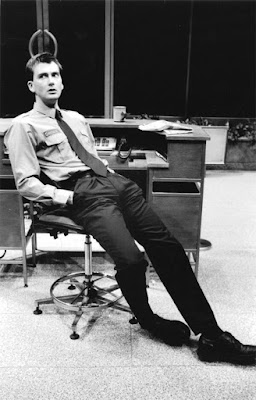22 January 2017
New film features the El Dorados (Manchester By The Sea)
I rarely review films on this blog, but I'd like to say a few words about writer/director Kenneth Lonergan's Manchester By the Sea. I've admired Lonergan's work for a long time, and have had occasion to analyse his stage plays Lobby Hero and This Is Our Youth. He exemplifies the mantra of writing guru Tim Fountain: "complexity, not complication." Which is to say that rather than adding extraneous plot material, the focus in Lonergan's work is on the gradual revealing of character.
In his Regan-era stage play This Is Our Youth, for example, you could guess that one long scene would prove to be about the getting together of a rather timid and diffident young man and a young woman, but the fascination lay in the stumbling way in which this was achieved. And as the end of the play approached it was fairly obvious that that same young man was heading for a falling out with, or disillusion about, the male friend he hero-worshipped. On a beat by beat basis, however, the manner in which this played out was far from predictable, although the play's conclusion was wholly convincing and satisfying: you had no doubt that something major had happened by the end, with no turning back of the clock necessary or possible, as Pinter has it, despite an absence of overheated speeches to ensure that the audience been shepherded to that conclusion. As with the boy-meets-girl scene, the final scene took precisely as long to get there as was needed for us to absorb it. In other words, this is an adult writer who trusts his audience to join the dots, make the connections.
Lobby Hero, another stage play which had a brief run in London, was the same. A drip of information from the eponymous security guard's own mouth gradually allowed a less than flattering picture of him to form, despite his superficial charm. And his eleventh hour epiphany was no more than someone wrapped in delusion for so long might reasonably have achieved: a first step on the road rather than a radical transformation, but that was all that the play called for. And given the character's history it was a plenty big step. (Did I really just say "plenty big"?)
The same could be said for the ending of Manchester By the Sea. It's a story of redemption but on a recognisably human scale and it's an "adult" film in the way that the best of John Sayles's films are. I don't want to give anything away other than to say there are no quick fix solutions in the film, just an acknowledgement of human frailty and the possibility, at least, of hope. Which may make it sound more gloomy or portentous than it is. There are lots of funny moments - I heard around me what I think was the laughter of recognition in a scene set in a hospital ward. I was even able to suppress my mounting irritation at someone to my right eating popcorn in what is an arthouse cinema - than which there can be no higher praise.
Popcorn eaters: it is not helpful to eat slowly, stealthily all the way through the film. Just as the man who took occasional, delicate bites of an apple as I tried to immerse myself in the world of Hannah and Her Sisters at the same cinema some years earlier would have done better to cramthroat himself at the start - or perhaps restrict himself to medlar munching during those slightly overwritten voiceovers of the Michael Caine character. ("I have my answer! I'm walking on air!")
But I digress, what with being me. See Manchester By the Sea if you can. It is a film which doesn't seem to put a foot wrong: so many moments which could have been misjudged but aren't. As with his earlier film You Can Count on Me, the ending is not about unqualified joy, all obstacles magicked away, but it offers a hard-won hope, nevertheless.
Hey, the film even includes a brief snatch of the El Dorados' At My Front Door - which is as much a reason as I need to mention it in a doo wop-based blog.
Subscribe to:
Post Comments (Atom)



No comments:
Post a Comment